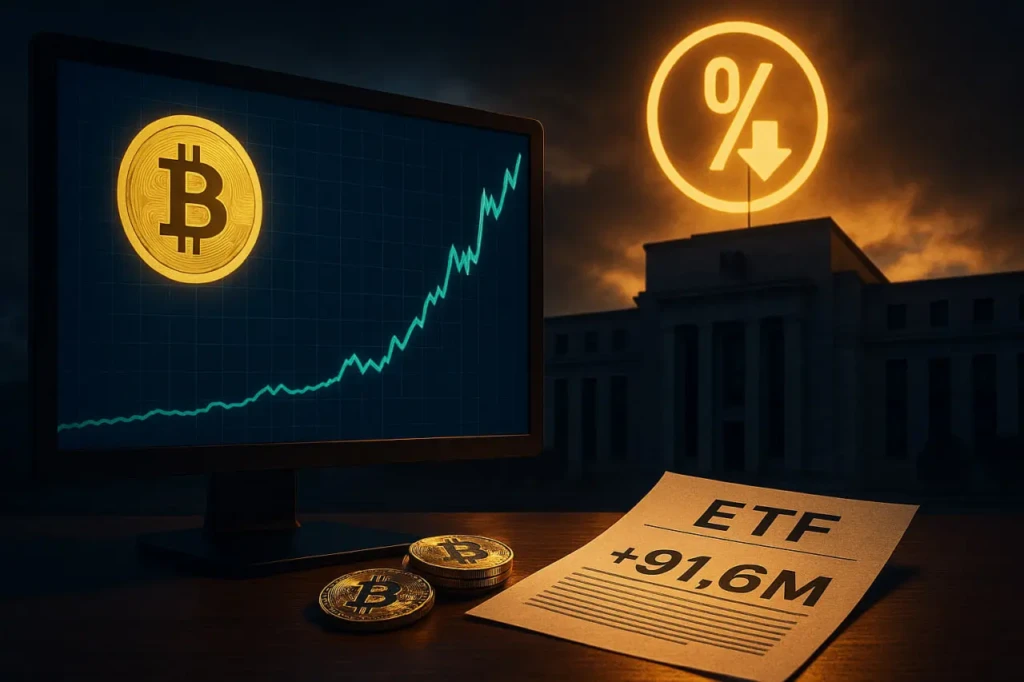Crypto ETF Market Redefines U.S. Finance in 2025
The Crypto ETF landscape in the U.S. has transformed dramatically in 2025, evolving from cautious regulatory experiments into a full-blown Wall Street gold rush. Once limited to Bitcoin and Ethereum, the exchange-traded fund market now spans altcoins like Solana, XRP, and even meme-inspired tokens such as Dogecoin and TRUMP.
This expansion signals more than financial innovation—it represents a shift in how traditional institutions, regulators, and retail investors engage with digital assets. Giants like BlackRock, Fidelity, and Ark Invest are at the forefront, capitalizing on a friendlier regulatory climate following leadership changes at the SEC. With filings for new funds accelerating, the U.S. is entering what many analysts call “Altcoin ETF Season.”
What Are Crypto ETFs and Why Do They Matter?
A Crypto ETF (exchange-traded fund) allows investors to gain exposure to cryptocurrencies without directly holding tokens. Instead, they purchase shares in a fund that tracks crypto assets through spot holdings or futures contracts.
These ETFs trade on traditional exchanges such as the NYSE and Nasdaq, offering regulated, familiar access for both retail and institutional investors. This framework removes barriers like digital wallets and private keys, making crypto exposure more approachable.
Two main types of crypto ETFs dominate the market:
- Spot Crypto ETFs – Backed by actual cryptocurrency holdings (e.g., Bitcoin or Ethereum).
- Futures Crypto ETFs – Track crypto prices using regulated futures contracts rather than direct holdings.
👉 SEC official guidelines on ETFs provide insight into how these funds are structured.
Bitcoin and Ethereum ETFs: The Gateways
The Bitcoin Milestone
The January 2024 approval of spot Bitcoin ETFs was a historic moment in U.S. financial markets. By holding real Bitcoin, these products offered direct exposure, triggering billions in inflows.
- BlackRock’s iShares Bitcoin Trust (IBIT) quickly dominated, capturing over 50% of market share.
- Fidelity’s Wise Origin Bitcoin Trust (FBTC) and Grayscale’s converted GBTC added significant depth.
- ARK Invest, VanEck, and Bitwise introduced competitive alternatives.
This legitimized Bitcoin as a regulated financial instrument, drawing unprecedented institutional participation.
Ethereum Joins the Race
By July 2024, Ethereum followed with the launch of spot ETFs. Nicknamed “digital oil” for powering DeFi and smart contracts, ETH attracted institutional demand almost immediately.
- BlackRock’s iShares Ethereum Trust (ETHA) and Fidelity’s Ethereum Fund (FETH) led inflows.
- Grayscale and VanEck converted or launched ETH-focused funds.
Within weeks, these ETFs accumulated over 3 million ETH, fueling a price rally and positioning Ethereum as the second-most important digital asset in regulated portfolios.
The Rise of Altcoin ETFs
With Bitcoin and Ethereum ETFs established, attention is now shifting to altcoin ETFs. Major candidates include:
Solana (SOL)
- Filings: VanEck, 21Shares, Bitwise, Grayscale.
- Known for low-cost, high-speed transactions.
- Approval odds: ~75%, with potential inflows of $3–6 billion.
Litecoin (LTC)
- “Digital silver” with technical similarities to Bitcoin.
- Strong liquidity and long history of stability.
- Approval odds: ~90%, making it one of the most likely next approvals.
XRP (Ripple)
- Despite legal disputes over security status, ETF filings are piling up from Bitwise, 21Shares, and Grayscale.
- Approval odds: 65–81%, with JPMorgan projecting inflows up to $8 billion.
Cardano (ADA) & Avalanche (AVAX)
- Cardano’s ESG-friendly narrative and Avalanche’s scalability attract interest.
- Both face regulatory hurdles, with approval odds near 65%.
Memecoin ETFs: From Internet Jokes to Wall Street
In a surprising twist, meme-inspired assets are entering ETF filings:
- Dogecoin (DOGE): Multiple filings from Bitwise, Grayscale, and Rex Shares suggest high approval chances.
- TRUMP Token: A politically charged memecoin ETF with low odds of approval.
- BONK and PENGU: Niche filings reflecting speculative demand, though approvals remain unlikely before 2026.
While speculative, memecoin ETFs highlight how far the appetite for crypto exposure has spread into mainstream finance.
What’s Changing at the SEC?
The SEC, once a major barrier, has become more open under new leadership. With improved surveillance mechanisms and growing market maturity, analysts expect altcoin ETF approvals to follow the domino effect set by Bitcoin and Ethereum.
CNBC coverage on SEC’s ETF approvals suggests that crypto regulation is shifting toward pragmatism rather than resistance, a trend welcomed by Wall Street.
FAQs About Crypto ETFs
What is a Crypto ETF?
A Crypto ETF is an exchange-traded fund that allows investors to gain regulated exposure to digital assets without directly holding the cryptocurrencies.
Are Crypto ETFs safe for retail investors?
Crypto ETFs reduce custody risks and offer regulated exposure, but they remain tied to volatile markets.
Which Crypto ETFs are approved in the U.S. as of 2025?
Bitcoin and Ethereum spot ETFs are approved, with altcoin ETF applications under review.
Will meme coins like Dogecoin get a Crypto ETF?
Dogecoin ETFs have strong filing momentum and may be approved soon, but others like TRUMP and PENGU remain speculative.
How will altcoin ETFs impact the crypto market?
Approval of altcoin ETFs is expected to boost liquidity, institutional adoption, and overall market legitimacy.
Conclusion: The Future of Crypto ETFs
The U.S. Crypto ETF market is rapidly expanding, with Bitcoin and Ethereum cemented as institutional cornerstones and altcoins preparing to follow. As regulatory attitudes soften, ETFs tied to Solana, Litecoin, and XRP could usher in billions in institutional inflows.
Meme-based ETFs may be speculative, but their emergence highlights Wall Street’s growing willingness to financialize even the most unconventional tokens.
For investors, tracking ETF approvals is no longer optional—it’s central to navigating the future of digital assets. In 2025, crypto’s path to mainstream adoption is no longer through exchanges but through ETFs traded on Wall Street.

